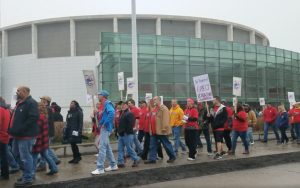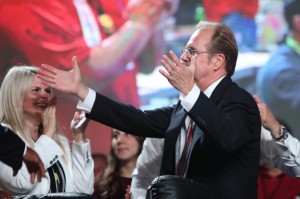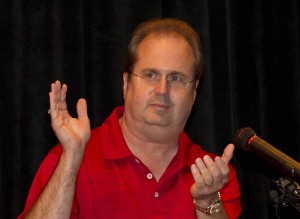The United Auto Workers heads into its bargaining convention this week against tumultuous backdrop that includes suddent plant closing, a grinding federal investigation of the union’s handling of training funds and grumbling among union members, who have made it plain this winter the expect some gains when the UAW goes to the bargaining table this summer with Detroit’s three automakers.
The resolutions adpted during the meeting will be broad so as not to encumber union bargainers in future negotiations but specific enough to shape the tenor of upcoming talks not only in the auto industry but also other sectors where the union has members.
“It is an ideal way to get members from a variety of workplaces and backgrounds together and discuss what is important to their fellow workers, their families and their communities,” UAW President Gary Joines said in a new issue of Solidarity, the union’s magazine.
”As the union heads into critical auto and other negotiations in 2019, this bargaining convention is especially important given General Motors’ decision to shutter three UAW-represented plants. The work done at this convention will help set the tone and strategy for fighting this devastating decision. More than 900 delegates from all sectors of the union — including auto, aerospace, agricultural implement, higher education, gaming, and public sector — will attend the convention,” said Jones, who took over as the union’s president last summer.

GM and UAW officials shown on July 13, 2015 marking the opening of contract talks. Many members feel like the UAW gave up too much last time.
(Lordstown plant manufactures last Chevy Cruze. Click Here for the story.)
The UAW has already begun a counteroffensive in effort to block GM’s plans to shutter plants in Lordstown, Ohio, Detroit, Warren and Baltimore. It’s filed a lawsuit, lined up political support for finding a way to pressure GM into revlersing its decision and even threatened a consumer boycott, particularly of GM products made in Mexico.
The reaction to GM’s decision is certain to make for a noisy convention when it’s gaveled to order inside Cobo Center.
But the union is facing off against General Motors at time when its reputation has suffered a major blow flrom a federal investigation that has left union staffers facing prison terms and destroyed the reputation of the late General Holiefield, who was one of the union’s most visible officers between 2006 and 2014 and was credited by the late Sergio Marchionne with playing a key role in saving Chrysler.
During his tenure as head of the Chrysler department, Holiefield took thousands of dollars of what amounted to bribes by diverting money frum the joint that is controlled jointly by the UAW and Fiat Chrysler Automobiles N.V.
Jones and his predecessor, Dennis Williams, have blamed the scandal on a handful of union staff members, who let their greed get the better of them. However, the FBI and federal prosecutors are continuing to investigate with the help union staff members who have now pled guilty to federal crimes.

The UAW protested before and during the annual NAIAS Charity Preview, in hopes to changing GM's opinion about the plant closures.
Even before the first federal indictments were hand down nearly two years, the union’s leadership had faced a revolt by rank and file over the two-wage system that the union had adopted as a defensive measure during the great recession.
When the recession ended and the automakers began hiring again, the lower wages paid workers on the second tier became a major point of contention among union members and led to the decisive rejection of a tentative contract with FCA.
The resentment about the two-tier system lingers in the union ranks and activists have added new complaints about the use and mistreat of temporary workers at GM, FCA and Ford.
In addition, resolutions forwarded to the bargaining convention from union locals around the country have also called for higher wages, a return of the cost-of-living allowance and upward adjustments on the pensions paid to UAW retirees by Detroit’s automakers.
The resolutions also have taken aim at the growing disparity between executive pay and workers on the assembly line, which has grown steadily during the past two decades as the companies have used salary consultants to justify pay increases for top executives.
The United Auto Workers heads into its bargaining convention this week against tumultuous backdrop that includes sudden plant closings, a grinding federal investigation of the union’s handling of training funds and grumbling among union members, who have made it plain this winter they expect some gains when the UAW goes to the bargaining table this summer with Detroit’s three automakers.
(Click Here for details about UAW suing General Motors over plant closures.)
The resolutions adopted during the meeting will be broad so as not to encumber union bargainers in future negotiations but specific enough to shape the tenor of upcoming talks not only in the auto industry but also other sectors where the union has members.
“It is an ideal way to get members from a variety of workplaces and backgrounds together and discuss what is important to their fellow workers, their families and their communities,” UAW President Gary Jones said in a new issue of Solidarity, the union’s magazine.
”As the union heads into critical auto and other negotiations in 2019, this bargaining convention is especially important given General Motors’ decision to shutter three UAW-represented plants. The work done at this convention will help set the tone and strategy for fighting this devastating decision. More than 900 delegates from all sectors of the union — including auto, aerospace, agricultural implement, higher education, gaming, and public sector — will attend the convention,” said Jones, who took over as the union’s president last summer.
The UAW has already begun a counteroffensive in effort to block GM’s plans to shutter plants in Lordstown, Ohio, Detroit, Warren, Michigan, and Baltimore. It’s filed a lawsuit, lined up political support for finding a way to pressure GM into reversing its decision and even threatened a consumer boycott, particularly of GM products made in Mexico.
The reaction to GM’s decision is certain to make for a noisy convention when it’s gaveled to order inside Cobo Center.
But the union is facing off against General Motors at time when its reputation has suffered a major blow from a federal investigation that has left union staffers facing prison terms and destroyed the reputation of the late General Holiefield, who was one of the union’s most visible officers between 2006 and 2014 and was credited by the late Sergio Marchionne with playing a key role in saving Chrysler.
During his tenure as head of the Chrysler department, Holiefield took thousands of dollars of what amounted to bribes by diverting money from the joint that is controlled jointly by the UAW and Fiat Chrysler Automobiles N.V.
Jones and his predecessor, Dennis Williams, have blamed the scandal on a handful of union staff members, who let their greed get the better of them. However, the FBI and federal prosecutors are continuing to investigate with the help union staff members who have now pled guilty to federal crimes.
Even before the first federal indictments were hand down nearly two years, the union’s leadership had faced a revolt by rank and file over the two-wage system that the union had adopted as a defensive measure during the great recession.
When the recession ended and the automakers began hiring again, the lower wages paid workers on the second tier became a major point of contention among union members and led to the decisive rejection of a tentative contract with FCA.
The resentment over the two-tier system lingers in the union ranks and union activists have added new complaints about the use and mistreat of temporary workers at GM, FCA and Ford.
In addition, resolutions forwarded to the bargaining convention from union local around the country have also called for higher wages, a return of the cost-of-living allowance and upwards adjustments on the pensions paid to UAW retirees by Detroit’s automakers.
(To see more about the UAW’s efforts to reverse GM’s decision to close plants, Click Here.)
The resolutions also have taken aim at the growing disparity between executive pay and workers on the assembly, which has grown steadily over the past two decades as the companies have used salary consultants to justify pay increases for top executives.



